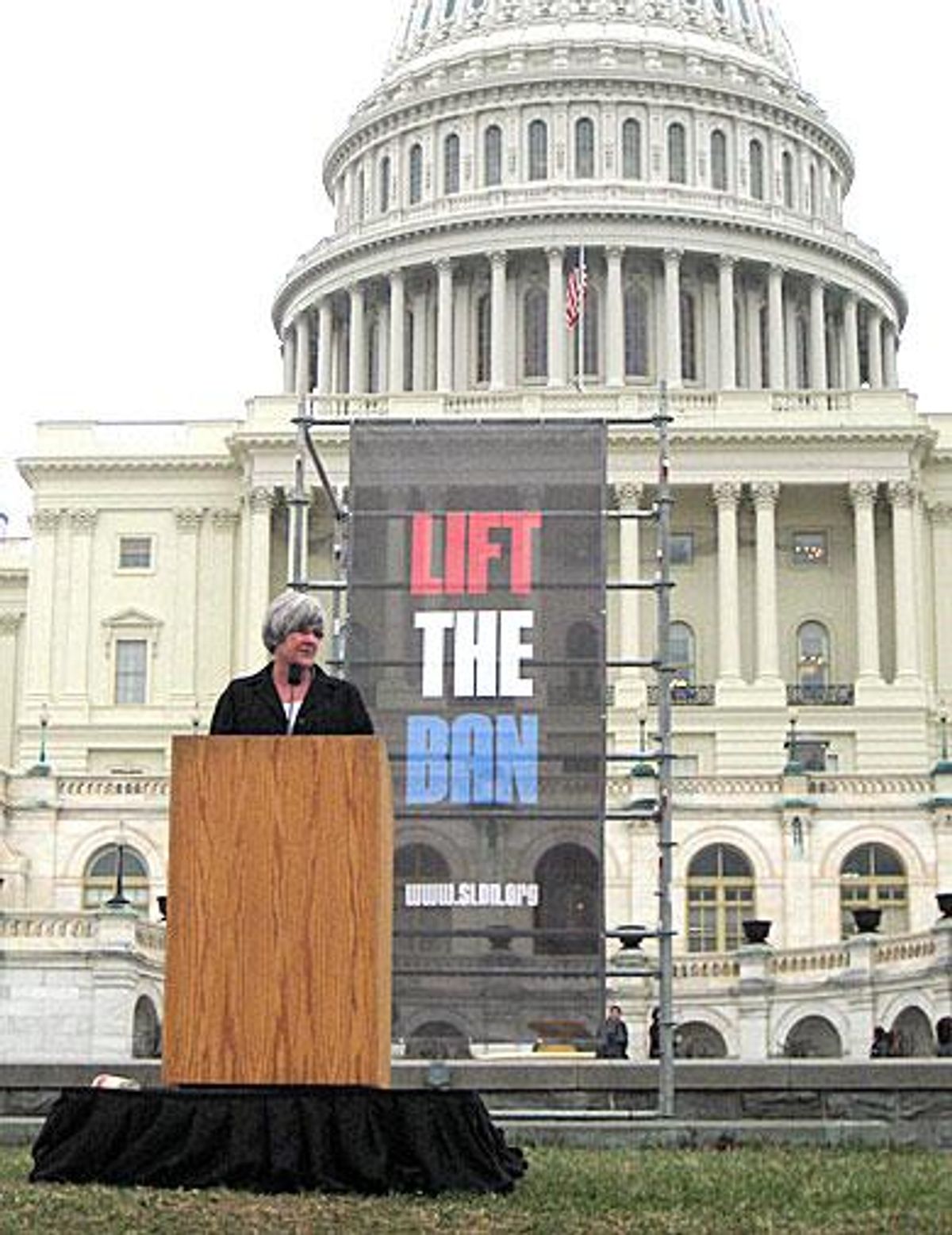Maj. Margaret Witt took
the podium Friday at a rally to repeal "don't ask, don't
tell" and, with the Capitol as her backdrop, said, "For 18
years I served in the military, before the Air Force discharged
me because they found out I was a lesbian. But I don't want to
leave, and I'm challenging the government's attempt to
discharge me."
Even as Witt spoke,
legal minds at the White House are mulling what to do with her
challenge, a court case that will likely force the Obama
administration to take its first official action on the
military policy prohibiting lesbians, gays, and bisexuals from
serving openly. The Department of Justice (DOJ) currently has
until April 3 to decide whether they will ask the U.S. Supreme
Court to review Witt's case -- a ruling from the ninth circuit
court of appeals that some believe will weaken the law
because it suggests it must be applied on a
case-by-case basis rather than indiscriminately.
"The Bush
administration probably would have argued it just because they
hate us," says Bridget Wilson, an openly gay attorney in
private practice who has worked with LGBT military issues for
35 years. "But it's a new day in Washington. My sense is that
they don't want to appeal this because they don't want to get
into a battle over 'don't ask, don't tell' right now."
President Obama has
flatly endorsed a repeal of the ban. Asked what guidance the
White House is providing to the Department of
Justice on this issue, a spokesperson for the
administration responded, "The President supports changing
'don't ask, don't tell.' As part of a
long-standing pledge, he has also begun consulting closely with
Secretary Gates and Chairman Mullen so that this change is done
in a sensible way that strengthens our armed forces and our
national security."
But what the Justice
Department will ultimately do is anybody's guess, in part
because the ruling on
Witt v. United States Department of the Air Force
does not necessarily provide a direct challenge to "don't
ask, don't tell." If it did, the DOJ would be much more
likely to seek a Supreme Court review, because the department
would be compelled to defend the law.
Major Witt, a highly
decorated nurse, was suspended from service in 2004 -- two
years shy of full retirement benefits -- and discharged under
the ban in 2007. When her attempt to fight the dismissal was
denied a hearing by a federal judge, her lawyers appealed the
decision and the ninth circuit ultimately ruled that Witt had a
right to her day in court. The decision concluded that,
although the government had previously been able to discharge
any LGB person under the policy, new protections provided by
the 2003
Lawrence v. Texas
ruling now required the government to actually prove that an
individual's presence was indeed harming unit cohesion. The
ruling was also carefully constructed to only apply to Major
Witt's case.
"The court did not
rule on the constitutionality of 'don't ask, don't tell,' but
it said because of a new precedent, 'don't ask, don't tell' has
a higher burden to meet in order for an individual to be kicked
out," explains C. Dixon Osburn, CEO of Osburn Management
Consulting Company and former executive director of
Servicemembers Legal Defense Network, a group that advocates
for repeal of the policy.
Osburn, a cofounder of
SLDN, says the movement has always argued that the government
had no evidence demonstrating that letting LGBs serve openly in
the military would hurt unit morale or military
preparedness.
"We have tried for
the last 15 years to get the government to defend themselves
and the courts have just looked the other way," he says.
"This case is saying, 'No, we won't turn a blind eye to this,
you need to give us evidence that the law is sensible on a
case-by-case basis.'"
Even though the
decision doesn't overturn the policy, "It's a dramatic change
of interpretation," says Wilson. "What
Witt
has really done that is kind of fun is, it has implied that
this behavior was too remote to be enforced under this policy
-- that it's not reasonable to enforce the policy for something
that the Major never brought to anyone's attention and, in
fact, was fastidiously closeted." Witt had been in a
committed relationship with a civilian woman at the time and
lived miles away from the military base.
But Wilson, who
considers the ninth circuit's ruling a win, also sees a
potential pitfall with the interpretation.
"I don't want to keep
'don't ask, don't tell' and let people stay in if they are
fastidiously closeted," she explains. "That's not a victory
to me. The victory is that there are some things that are too
remote for the government to be regulating -- too private and
too personal."
Wilson wagers that the
DOJ may let the ruling stand since it merely sends the case
back to the lower court to be argued, which has yet to
happen.
"If I were them, I
would say, 'We're going to let Major Witt go forward with this
and we can deal with the result later," says Wilson, adding
that part of their equation will surely be a matter of
resources. With wars on two fronts, Ponzi schemers to be
prosecuted, and drug cartels to battle, Wilson offers, "If I
were the attorney general, I might have bigger fish to fry. How
much energy does the Department of Justice want to spend on a
case that by its very decision is limited to this one
individual."
Osburn hopes the DOJ
takes a pass on this case, in part, because the Obama
administration has already said it favors a review of the
policy, which he says, "should happen at the Pentagon." A
bill to repeal the ban was introduced by Rep. Ellen Tauscher in
the House last week, but Osburn notes that a push from the
Pentagon would likely speed the legislative process. A Senate
sponsor for the legislation has yet to emerge.
But both Osburn and
Wilson doubt congressional action will take place soon enough
to render the Witt case moot for the Justice Department. In
fact, the government already asked for an extension on March 5,
and Osburn said it may ask for yet another once April 3 rolls
around. "They're still getting people in place at the
department," he says.
Major Witt is in
Washington, D.C., this weekend to receive a Courage Award at
SLDN's national dinner, but executive director Aubrey Sarvis
was not available to comment for this article. Asked if the
organization was consulting with the White House on Witt's case
and what action they hoped would be taken, a spokesperson said,
"SLDN doesn't see the delay as a significant development
in the case. We continue to be supportive of Major Witt's
fight, which is why we're honoring her at this
weekend's gala."


















































































